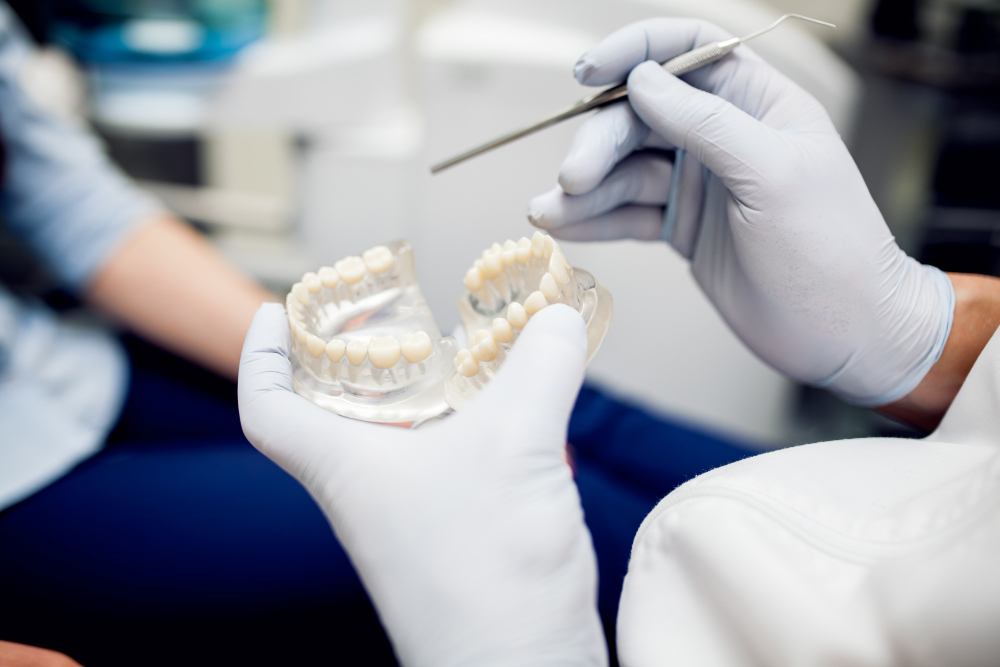
Denture adhesives, which can be applied inside or on top of dentures to keep them in place, can be pastes, powders, or adhesive pads. Zinc is occasionally used in denture adhesives to improve adherence. Most of the time, denture adhesives shouldn’t be necessary for well-maintained and fitting dentures. Dentures progressively loosen due to the mouth’s bone structure thinning over time.
When this happens, the dentures need to be relined or new ones that fit the mouth. By filling in the gaps left by bone loss, denture adhesives temporarily prevent dentures from coming undone.
Denture Adhesive Techniques: What are They?
Adhesives for dentures are used to improve their stability and retention. The following are some basic methods for applying denture adhesive.
Dry and clean dentures: Make sure the dentures are fully cleaned and dried before using any adhesive.
Sparingly used: Starting with a small adhesive and adding more as necessary is frequently preferable. Oozing and pain might result from overusing the glue.
Distribute Evenly: Evenly distribute the glue by putting little amounts or dots along the denture’s ridge or the portion that rests against the roof of your mouth. To stop oozing, avoid applying glue close to the margins.
Seat Dentures: Dentures should be securely seated in your mouth once the adhesive has been placed. To ensure they are properly seated, bite down for a few seconds.
Avoid Eating or Drinking: To give the adhesive time to set, wait a few minutes after putting the dentures in your mouth before eating or drinking.
Remove Dentures: Gently jiggle the dentures to break the adhesive seal while rinsing your mouth with warm water. A further aid is the use of over-the-counter denture glue removers. After removal, properly clean your dentures and gums to remove any remaining adhesive.
Regular Exams: For those who wear dentures, routine dental exams are crucial. The need for adhesives is reduced by proper fit.
Select the Proper Product: There are several denture adhesives, including lotions, powders, and strips.
Follow Manufacturer Instructions: Read and follow the manufacturer’s instructions. Consistently read and adhere to the adhesive manufacturer’s directions.
How may a technique for denture glue lengthen the life of a denture?
Denture adhesive procedures do not directly improve the lifespan of the dentures themselves. A simple online search of the phrase denture repair near me can point you in the direction of dental offices that can help fix your broken dentures. However, by ensuring proper fit and maintenance, denture adhesives can indirectly help extend the dentures’ life when used properly.
Prevents unequal Forces: By keeping the denture in place, adhesive lessens the possibility that it may experience unequal forces while the wearer is speaking or eating. The denture may crack or break as a result of uneven stresses.
Reduces Wear and Tear: Proper adhesion can reduce wear and tear on the denture base and the teeth by making it less likely for the denture to slip, rub, or grind against the gums beneath it or the opposing denture.
Reduces Dropping Risk: Dentures firmly fixed to the mouth are less prone to fall out during normal activities. As a result, there is less chance that they may be dropped or damaged during unforeseen dislocations.
Encourages Proper Cleaning: As you must properly clean your dentures before applying adhesive, this habit encourages correct and regular cleaning.
Prevents Overuse: Properly fitting dentures with the correct adhesive dissuades users from applying too much pressure or over-biting to keep the dentures in place.
Increases Confidence in Care: People who wear dentures are more likely to wear them as instructed, maintain them correctly, and adhere to a regular care regimen when they feel that their dentures are firmly in place.
Lastly, there is a reduced chance of neglect. If users are confident and at ease with their dentures, they are less likely to neglect them. Also, dentures can last longer if they are kept moist and cleaned frequently.